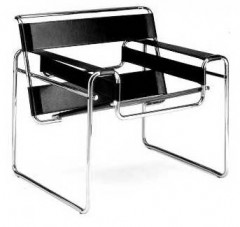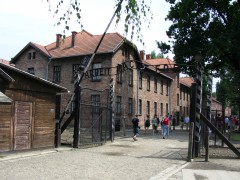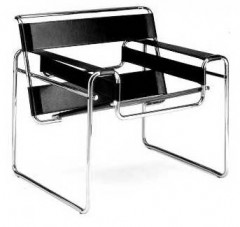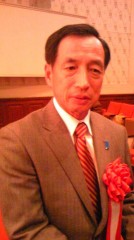29 November 2009
Short Novel: "Bauhausler" Conclusion
A story of Japanese woman who experienced Bauhaus art and love romance in Berlin, early 1930's when Nazis came to power.
Please read introduction first.
Auschwitz Museum in Oswiecim, Poland, November 2009
"Now let us read the will she left. It was also a letter to our museum."
The head of the museum said.
"It was 1991 when I came back to Berlin. A year after reunification of Germany. Berlin Wall was fallen down. People were pleased with new reunited Germany. After the war, I started a hotel management in Tokyo for foreigners because I spoke good English and German. Japan turned into democratic nation with new constitution. The first hotel I managed was very small one but as reconstruction and development of Japan underwent, my business expanded, I could own more and bigger hotels in Japan and later in other countries. Next thing I knew, I became a successful business woman. People call me "Hotel Queen." It seemed my life restarted after the war. I felt like I never had any life in pre-war era.
When I turned age of 80, I decided to retire. I've accomplished everything I thought I should. Last business trip for me was Berlin and Krakow. Chikano Hotel opened new franchises in reunited Berlin and the old capital, Krakow in Poland. About 60 years have passed since I left Berlin. The city experienced heavy bombing in second world war and division by the wall during the Cold War era.
The view and scenaries seemed to be drastically changed from my memories except Brandenburg Gate.

I stood at Brandenburg Gate recalling my old memories. I still remembered some of the things. Yes, Bauhaus. School, friends, Meisters. But it was almost fading away as I became very old. However, Bauhaus has been part of my life even after I left. I tried to acquire Bauhaus furniture and design in my hotels. It was simply because I liked that. After I attended opening ceremony at Chikano Hotel, Berlin, I left for Krakow. Very last franchise I visit before retirement. It was my first visit to Krakow. I was pretty much impressed by the city's beauty. I was so glad that such a beautiful city became my last business deal. After the opening ceremony ended, my career as hotel woman ended. So I decided to have first trip in my retirement. The place was there in Krakow. Local tour guide recommended me to visit countryside of the city, which was also beautiful, too.
Then the tour guide asked if I knew Auschwitz. I told him I heard about it before. He told me I should visit there because it was world's historic place. I knew how historic it was because I heard about what Nazis did to so many innocent people in the war. I predicted thing like that would happen even before the war stared because I did witness what happened. That was the reason I had to leave Berlin a very long time ago.
At first I entered Birkenau and looked around the concentration camp that had a railway station. The final desitination for the prisoners. They became prisoners not because of what they did but because of what they were like being Jew, Roma, or homosexuals. When they arrived, they were divided to go to gas chamber or cottage. Those who could work had to be survived for forced labor. They had to live in cottages like ones for livestocks. When they became useless, they were easily executed in gas chamber or shooting place or by any other brutal method.
I went to the museum exhibition in Auschwitz main building. I saw so many things such as hairs, trunks, prosthetic limbs, shoes taken from prisoners. Over one million were killed in this place. I was shocked and saddened. But I had to face most shocking thing in my life there. I walked on the corridor of the museum and saw the line-up of photo frames hanged on the wall. The guide told me they were all black and white prisoners face photos. Some of them had flowers on top of the photo frame. That was what the survival families left. I saw the photos passing by. All were shaved head and looked frightened. I had to stop by at one photo. I looked at it carefully and then fainted.
A few minutes later, I woke up and drunk a glass of water at the office room. I asked who he was. I was very sure but I wanted to confirm. Then the museum staff checked out and told me he was whom I knew. Meister Marcus Weiss. The record indicates he was arrested for treason in 1938 by Gestapo. After years of deportation to several camps, he was finally deported to Auschwitz and executed in 1943.
I recalled all my memories with him. From when I first met him at Bauhaus and aparted in my apartment. After I left Berlin, I desperately waited for him but I gave up and decided to live my life. I almost forgot him. But I finally saw him again. In such tragic way. I told my story regarding relationship with Marcus to the museum staff. They all understood how I felt. I decided to become a donor for preservation of this monumental place. The place no one should forget and anybody should know. Please know my story."
The head of the museum finished reading the letter. He seemed to be moved to tears because he knew Madame Chikano very well. He saw her several times before she passed away. He continued the speech.
"Madame Chikano indeed became major contributor for preserving the museum. She donated so much money to this museum while she was living. Because she had no relatives or family members, most of her fortune went into preservation of this museum. She will continue to be a major contributor of this museum."
The head of the museum smiled and pointed out a Wassily chair on the stage.

"Her experience symbolized paralell of Bauhaus and Auschwitz. Both German made. Germany-born Bauhaus was once banned by Nazis who built Auschwitz. It was revived in post war era in the U.S. by exiled Bauhaus Meisters. Bauhaus art concept became mainstream for modern design and architecture. Bauhaus school was gone but its concept and art survived and prevailed. Madame Chikano spent only for 5 months in Bauhaus but her life experience was like how Bauhaus went through. The chair was one of what she used in her office room. To commomerate her contribution, we would like to place this in this museum." He put bouquet flowers on it and said,
"Rest her soul in this place and Bauhaus."

THE END!
This novel is copywrighted by this blog's manager, Masagata.
Next short novel would be "When East meets West" or "Fullbrightor" or anything else.
17:41 Posted in My novel | Permalink | Comments (0)
23 November 2009
Prisoners of the British, Japanese Soldier's Experience in Burma
Actually this is Japanese book written in Japanese and first published in Japan as "Aaron Shuyojo (Aaron Camp.)"
It was later translated into English. The book wasn't very popular in Britain. But in Japan it has become one of the most famous book of POW experience in the second world war. The writer Yuji Aida, who was drafted to the imperial army became captive in Burma by British military after Japan surrendered. He wrote the book after he came back home.
I learned about this book since former Air Force Chief, Mr. Tamogami, who was dismissed after releasing controversial essay in public quoted this in his speech to justify Japan's aggression in the war. To say it was the war to liberate Asians from white dominated nations.
The below is what I was impressed in the book including what Tamogami quoted.
1. When the prisoners complained about the treatment, British officers said "That was what exactly your military did to us."
2. When one of soldiers in his corp apologized to the British for the war, the British preached him not to apologize because he believed he fought against Samurais.
3. When the prisoners went to female officers' house to clean, they met naked women hanging around not being embarrassed by their presence.
4. British higher ranking officers were taller than their low ranking subordinates and spoke different English because the high ranking people were from elite class.
5. Burmese were friendly to Japanese because they had been oppressed by the British under colonization.
What Mr. Tamogami quoted was No.3. The writer's analysis of why they weren't embarrassed was that they did not see Asians including Japanse as same human race. Asians were regarded as livestocks or animals, they should have reacted differently if white men came into their house. White racism was more sophisticated than Japanese one because Europeans had raised livestock in order to make a living so they got used to treating other people inhumanely. White people's brutal act was systematic rather than emotional. That was how he viewed.
I don't agree with his opinion. Japanese did systematic slaughter in the past. Like 731 Unit in Manchuria, and mass-murder of POW in Nanjing, China, 1937.
Recently Japanese people have become hostile to westerners and more nationalistic, so such thing was brought up.
However, I wonder if you, white reader would agree with the writer's points of view?
Are white women react not embarrassed if Asian male stranger came into the locker room when they are naked? If a stranger was white man, they would be embarrassed? Or vice-versa?
11 November 2009
Short Novel: Bauhausler, Chapter 8
A story of Japanese woman who experienced Bauhaus art and love romance in Berlin, early 1930's when Nazis came to power.
Please read Introduction first.
30 January, 1933, Adolf Hitler was appointed as Chancellor of Deutscheland Parliament. On that day, Masako witnessed Storm Troopers marching on the street singing Nazi-anthem "Horst Wessel Lied," carrying swastika banners and then shouted "Sieg Hail, Sieg Hail (Victory for us.)" It was a feaful scene.
Hitler's inauguration of Chancellorship was very shocking news for Bauhaus school teachers and students, who were preparing for upcoming Carnival event. Marcus took charge in stage interior and other teachers took charge in clothes, dancing, and music for the stage. Not just stage show but exhibition shows were prepared. Students were also involved in planning the Carnival event.
The purpose of the event was to gather donation from attendees and eventually get funding from rich sponsors. This was a great opportunity to appeal to the public how innovative Bauhaus art was. They were desperate because they were on the edge. Now Nazi took control of the country's politics. They hate Bauhaus. Whether they would be diminished or survived was uncertain.
Masako was chosen as one of dancers on the stage. Masako would perform Modern Bauhaus dancing combined with tradtional Japanese dances which she learnt from childhood. The theme of the stage show was "Tolerance." Using students from all over the Europe and the rest of the world, the show would tell how important it was to accept various cultures and values of the world. Bauhaus could be common ground for all the people in the world, they believed.
Germany has become more and more nationalistic day by day. They had to fight against it. The antagonism towards foreigners and Jews was growing. Nazi frequently made anti-Jew announcement on radio speeches. Why they hate Jews, or ordinary people hate Jews? Masako wondered and asked Marcus.
Marcus described how Jews immigrated to Europe, and why they became outcast of the society. Jews were recorded to have migrated from Middle East to the Europe around 10th century. As Christian churches dominated the society, they were treated as outcast because they had different religious faith. Interestingly Christianity was born from sub-division of Judaism in Israel. Jesus Christ was Jew.
During that time to modern times, their most common business was money lending or financial planner. It was because in Christianity, money was thought to be sinful thing so Christians did not want to handle it. Feudal lords used Jews to handle finance and budget matters. Jews were very good at it. Consequently Jews dominated financial sector of the society. That was why still in modern times most banks were run by Jews. They were ousiders and had different faith and thinking from ordinary citizens. They became easy targets for those who were frustrated. Leaders or politicians used them as scapegoats whenever bad things happen in the society.
Now Jews were thought to be plotting a conspiracy of dominating the world by money. Or dominating the world by communism because Karl Marx, Jewish scholar originated communist theory by writing a book "Das Kapital."
Marcus said he admired Marx's idea however, he did not follow Russian communism because it never matched Marx's idea. Capitalism should be completed before entering into Communist economy. What Russians led by Lenin did was creating commnism ommitting capitalist phase. Marcus believed communism would prevail after capitalism phase was completed. He and his friends were studying what to do to form ideal commuism.
The economy was in bad shape because Great Depression hit the world. Especially German economy had been in terrrible situation since Versaille treaty demanded the country to pay enormous compensation for the war defeat. Hyper-inflation occurred. Weimar Republic could not make things better. In such turmoil, people wanted to rely on powerful leader like Hitler, who seems to change things better, who was very good at attracting people by delivering powerful slogans.
On third weekend of February, the Carnival event started at Bauhaus school building in Berlin.
Bauhaus products such as furniture including Wassily Chair, lamps, tablewares, and various art objects were displayed with description of how each of them was designed, how it functioned and what the beauty of it was. They were of course, for sale. Visitors were pleased with what they saw and some of them bought the goods.
Meister guide explained to them advantage of Bauhaus concept in modern times. By simplifying the products, the industries could enable mass-production of the goods more efficiently at lower cost.
The hottest event was stage show performed in a theatre set in a gymnasuim by Bauhaus students. Masako was in it. The title of the show was "Tolerance and Modern Life." Students from Germany, Spain, Poland, Turkey, Japan and various other countries gathered.
The curtain rose, what the spectators saw was swastika lined up. As tune of Horst Wessel started the swastika rotated like windmill. It was funny to see. The spectators laughed.
Then the dancers showed up between swastika windmills and suddenly lined up on the stage. They were all women including Masako. They all wore simple white cloth that covered from shoulder to toe. Then they got connected placing arms on shoulders with one another and started line-dance as jazz music started for this. Jumping, kicking, moving back and forth, and side by side, it was kind of humorous dance scene.
Then each dancer did her own cultural dance one after another. Spanish student, Isabell danced flamenco, Polish student Natalia danced polonaise, Turkish student Fatoma danced belly dance. Masako danced Nichibu batterfly dance. All did in white cloth, not in its unique traditional dance custume. Each of them danced with its own dance music but performed in violin, sachs, and piano. It was to describe Bauhaus attracted so many kinds of people from all over the world.
Then suddenly several men in taxiude showed up and carried Bauhaus's most popular chair, Wassily pipe chair. It was designed by the school's first term student, Marcel Breuer. Breuer designed the chair as a present for his teacher, Wassily Kandinsky. It consisted of pipes and leather sheet. It was the first pipe made chair in the world. The sitting plate of the chair was tilted but the backrest was also tilted. So one could sit down relaxed. It was functionally designed.

The women sat down on the chairs which the men brought and then started to dance by kicking, clapping hands, bringing their feet up, crossing legs. Then they all stood and turned around. The men set up the table and tablewares such as folks, plates, tea pots, cups. They were all Bauhaus design products, which were metal and simplified form. Women gathered with men at the table and pretended to have meals and drink tea. After that act, each man and woman made a pair and pretended to sleep on a bed lined up behind the table. It was like daily life simulation by Bauhaus products.
Then all of them danced on bed, and jumped from the bed to the floor. They danced what might be called "Bauhaus modern dance" on the stage floor. It looked like pantomime, ballet, bellydance, Nichibu, or waltz. Danced with very unique music blending of all sorts of janre such as classical, opera, jazz or anything else. Some of dancers started to dance with a bar, a ball and a fan. Masako used a fan to perform more accurate but more vivid version of Nichibu batterfly. The spectators were amazed with the show. They were never bored with this innovative show.
The climax was singing of German anthem by all performers, but only 3rd verse, which Bauhausler believe should represent tolerance of Germany.
Einigkeit und Recht und Freiheit
(Unity and justice and freedom)
Für das deutsche Vaterland!
(For the German fatherland!)
Danach lasst uns alle streben
(For these let us all strive)
Brüderlich mit Herz und Hand!
(Brotherly with heart and hand!)
Einigkeit und Recht und Freiheit
(Unity and justice and freedom)
Sind des Glückes Unterpfand;
(Are the pledge of fortune;)
|: Blüh' im Glanze dieses Glückes,
(|: Flourish in this fortune's blessing,)
Blühe, deutsches Vaterland. :|
(Flourish, German fatherland. :|)
When the show finished, all the spectators stood up and clapped their hands. It was standing ovation. Bauhausler were convinced that they would survive and even continue to strive!
On 28 February 1933, the Parliament building was burned in an arson attack. President Hindenburg declared national emergency for the defense of the nation. It was reported that the arson was done by a communist.
In March Nazi Party drafted Full Power Law that concentrated all the authorities of the state on one government, which would be Nazis. The law was passed by two thirds of majority. It was because some of opponent members were arrested before the passage of the law. Hitler officially became dictator of Deutschland.
To be continued to Chapter 9.
01:01 Posted in My novel | Permalink | Comments (1)
04 November 2009
Yakuza came to US to get a transplant surgery
One boss of Yakuza, Japanese organized crime mafia came to U.S. to get a transplant liver surgery at UCLA medical center.
According to the CBS 60 Minutes Report, FBI permitted him to enter the U.S. in exchange of information he has and UCLA is thought to have received huge money from him.
Sounds scary!
As this report says Yakuzas are openly walking on the street in Japan. That is a difference from American mobs.
They are from oppressed class of Japanese society like Korean immigrants.
You can't trust the police when it comes to combatting Yakuza. Yakuza bribes them and even politicians.
I hope this brave journalist in the report would survive. His life being threatened because he wrote an article about Yakuza refusing to accept money for not writing the article.
19:38 Posted in Japan News, Politics, US-Japan relationship | Permalink | Comments (0) | Tags: yakuza, crime






